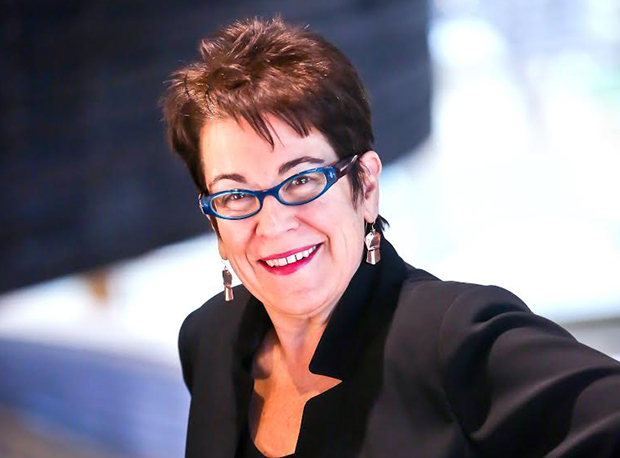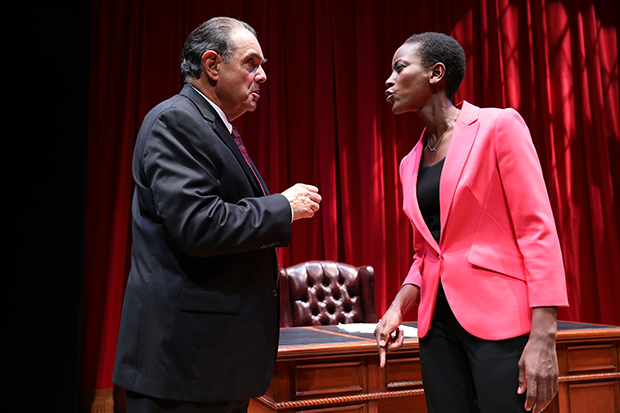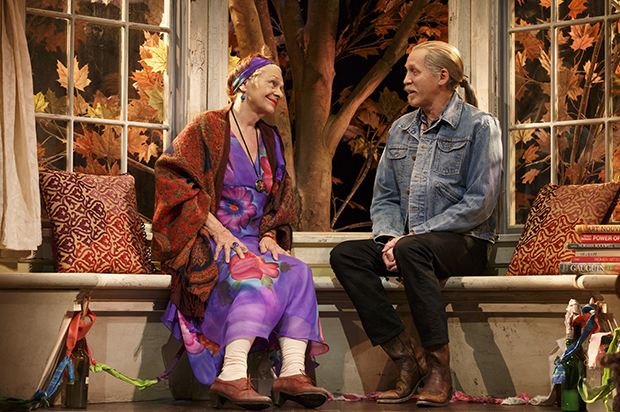First Person: Words of Hope From Arena Stage's Molly Smith
The theater’s artistic director reflects on the power of theater and the rejuvenation that awaits us.

(© Tony Powell for Arena Stage)
"In the dark times
Will there also be singing?
Yes, there will also be singing.
About the dark times."
—Bertolt Brecht (motto to Svendborg Poems)
When I saw the blooming cherry blossoms this year, I was reminded of the resiliency of nature and the need to find joy in the moment. Washington, DC, is always beautiful in springtime, and the blossoms remind us of rebirth. This season is Arena Stage's 70th, and it started out very differently than how it has ended. Unexpectedly cut short. Our community and the entire country are reeling.
Arena Stage has been creating theater for 70 years — and over this time Washington has experienced so much and changed immensely. In 1950, we were barely eight years out of World War II when Arena was born. In 1968 much of the city was burned in four days of riots following the assassination of Martin Luther King Jr. The city has witnessed 12 presidential inaugurations, 9/11, and the Great Recession.
In 1950, there was not a resident theater movement. Arena Stage was one of the first professional theaters outside Broadway that was not a touring house. Arena produced plays with artists that lived in Washington. Arena was an early pioneer in the not-for-profit movement. Arena Stage is a flagship American theater that cannot perform in order to keep our audiences, artists, and staff safe.
"It is not enough to hold the line against the dark. It is your responsibility to lead into the light. People don't like the light — it reveals too much. But hand in hand with the creative artist, you can lead people into the wisdom that is known to all other animals: simply, that it is the dark we have to fear."
—Edward Albee, Stretching My Mind (essays)''
The actor stands in for us and lives out their struggles in such a way that we also stand in their shoes — and rejoice with them and mourn with them. Our job as artists is to remind our fellow human beings of our shared humanity, that better days are coming, to point the way to a different, more abundant future. I miss seeing audiences in our lobbies. I miss feeling the excitement right before the lights dim for another performance. How ironic that our greatest strength, gathering together for the chemistry of hearing and experiencing stories together, has been cut short.
I know that people will gather again for the arts because there is a longing to be together — there is a chemistry that happens in a theater when one can hear someone else's breath, sense their sighs, and feel the seats shake with raucous laughter. We were built as human beings to communicate through touch, through our voices, and through the chemistry of emotion that flows from person to person.

(© Joan Marcus)
In my time at Arena Stage we have produced stories about the martyrs of the civil rights movement, privacy on the internet, the scammers and cons among us, survivors of the Holocaust, Native Americans' fight for sovereignty, and so many other American stories. We tell stories in a different way than film and television; our medium is a shared connection between living, breathing artists on stage and the audiences breathing with them.
This virus has given all of us the most extraordinary challenge of our lives. Americans have always come together in times of great tragedy, from world wars to terrorist attacks to epidemics. This is a time of citizenship and deep sacrifice. We are seeing Americans come together to help each other in record numbers — from our valiant health care workers, fighting day and night to save lives at the risk of their own, to grocery store workers who keep us fed, to sanitation workers who help keep our towns running. Individuals are calling friends and families who are alone and isolated. Costume shops all over America are making masks for hospitals instead of creating beautiful costumes for the stage. The best in American exceptionalism is being demonstrated by most people, and hopefully the future will bring greater levels of inclusiveness and opportunity to the American persona.
We in theater, like so many other professions, are humbled right now. Each of us is mightily affected, and we are busy caring for friends and family. Yet we promise that when this is over we will use our creativity in the arts as we always have done to tell stories of survival, to memorialize those who have been lost, and to celebrate together.
Oh yes, we are already seeing innovations too. Isolation and loneliness are also diseases, and the arts have a special ability to combat both.
Theaters have been doing auditions for years through video, but now we are finding brand-new ways to communicate with audiences through streaming productions, interactive conversations with artists, online classes for all ages, and little pieces of art created by artists for audiences right now. If you weren't already proficient using Zoom and Teams, my bet is you are now!
How strange that the performing arts are a place where we come together physically to celebrate our humanity — and yet, even now while we're isolated in our apartments or homes, cut off from the warmth of human kindness — the arts are reaching out to people to help us get through. Online performances, virtual museum tours, people singing out their windows into the street. We go to the arts when we need humanity most.
The term human kindness keeps coming up for me and the need to listen to each other. I know each of us as Americans are doing the best we can during these challenging days, navigating new realities. From teaching children at home to taking care of neighbors, each of us is powering forward.
"There is always something left to love. And if you ain't learned that, you ain't learned nothing."
—Lorraine Hansberry, A Raisin in the Sun
When this is over, the theater will come roaring back.
We always have.

(© Joan Marcus)







